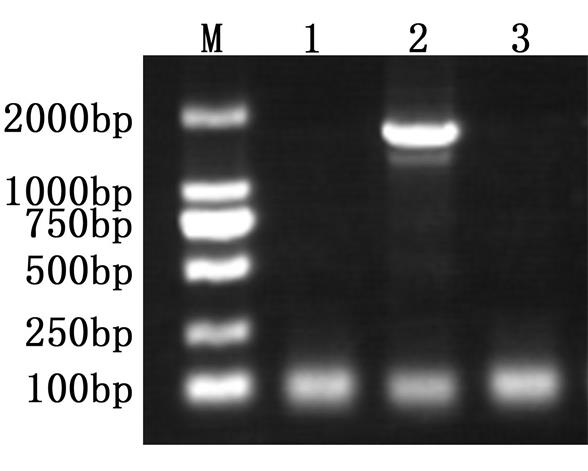Product Name :
Taq DNA Polymerase Antibody monoclonal antibody Background :
Polymerase Chain Reaction (PCR), invented by Kary B. Mullis, at the Cetus Corporation, who was awarded the 1993 Nobel Prize for chemistry for PCR, is a technique to exponentially amplify in vitro a small quantity of a specific nucleotide sequence using a thermostable (Taq) DNA polymerase. Anti-Taq Antibody is an ideal tool for hot-start PCR with Taq DNA polymerase. The Anti-Taq Antibody binds to Taq DNA polymerase and arrests the activity of Taq DNA Polymerase, preventing non-specific and primer dimer amplification resulted from non-specific priming at ambient temperature for the duration of time prior to PCR thermal cycling. During the initial denaturing step in PCR thermal cycling, the Anti-Taq Antibody is denatured and the Taq DNA polymerase is then released, thus regaining its full DNA polymerase activity. The result indicates that anti-Taq DNA Polymerase antibody increases the specificity and sensitivity of the PCR. Product :
Mouse IgG1, 1mg/ml in PBS with 0.02% sodium azide, 50% glycerol, pH7.2 Storage&Stability :
Store at +4°C after thawing. Aliquot store at -20°C. Avoid repeated freeze/thaw cycles. Specificity :
Taq DNA Polymerase Antibody monoclonal antibody detects endogenous levels of Taq DNA Polymerase Antibody protein. Immunogen :
Taq DNA Polymerase Conjugate :
Unconjugated Modification :
Unmodification
Taq DNA Polymerase Antibody monoclonal antibody Background :
Polymerase Chain Reaction (PCR), invented by Kary B. Mullis, at the Cetus Corporation, who was awarded the 1993 Nobel Prize for chemistry for PCR, is a technique to exponentially amplify in vitro a small quantity of a specific nucleotide sequence using a thermostable (Taq) DNA polymerase. Anti-Taq Antibody is an ideal tool for hot-start PCR with Taq DNA polymerase. The Anti-Taq Antibody binds to Taq DNA polymerase and arrests the activity of Taq DNA Polymerase, preventing non-specific and primer dimer amplification resulted from non-specific priming at ambient temperature for the duration of time prior to PCR thermal cycling. During the initial denaturing step in PCR thermal cycling, the Anti-Taq Antibody is denatured and the Taq DNA polymerase is then released, thus regaining its full DNA polymerase activity. The result indicates that anti-Taq DNA Polymerase antibody increases the specificity and sensitivity of the PCR. Product :
Mouse IgG1, 1mg/ml in PBS with 0.02% sodium azide, 50% glycerol, pH7.2 Storage&Stability :
Store at +4°C after thawing. Aliquot store at -20°C. Avoid repeated freeze/thaw cycles. Specificity :
Taq DNA Polymerase Antibody monoclonal antibody detects endogenous levels of Taq DNA Polymerase Antibody protein. Immunogen :
Taq DNA Polymerase Conjugate :
Unconjugated Modification :
Unmodification
-
 Application of the hot start PCR using anti-Taq DNA Polymerase antibody Lane1: Taq DNA Polymerase Lane2: Taq DNA Polymerase + Anti-Taq DNA Polymerase antibody Lane3: Taq DNA Polymerase + Control antibody
Application of the hot start PCR using anti-Taq DNA Polymerase antibody Lane1: Taq DNA Polymerase Lane2: Taq DNA Polymerase + Anti-Taq DNA Polymerase antibody Lane3: Taq DNA Polymerase + Control antibody
Bioworld Biotech only provide peptides for our antibodies and do not provide additional peptide customization services.
Price/Size :
USD 368/1mg/vial
Tips:
For phospho antibody, we provide phospho peptide(0.5mg) and non-phospho peptide(0.5mg).Describe :
Blocking peptides are peptides that bind specifically to the target antibody and block antibody binding. These peptide usually contains the epitope recognized by the antibody. Antibodies bound to the blocking peptide no longer bind to the epitope on the target protein. This mechanism is useful when non-specific binding is an issue, for example, in Western blotting (WB) and Immunohistochemistry (IHC). By comparing the staining from the blocked antibody versus the antibody alone, one can see which staining is specific; Specific binding will be absent from the western blot or IHC performed with the neutralized antibody.Formula:
Synthetic peptide was lyophilized with 100% acetonitrile and is supplied as a powder. Reconstitute with 0.1 ml DI water for a final concentration of 10 mg/ml.The purity is >90%,tested by HPLC and MS.
Storage:
The freeze-dried powder is more stable. For short time at 2-8°C. For long term storage store at -20°C.
Note :
This product is for research use only (RUO only). Not for use in diagnostic or therapeutic procedures.
 Taq DNA Polymerase Antibody monoclonal antibody
Taq DNA Polymerase Antibody monoclonal antibody  Datasheet
Datasheet COA
COA MSDS
MSDS SHIP
SHIP